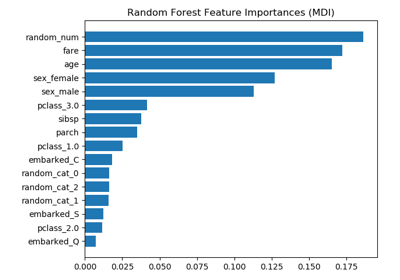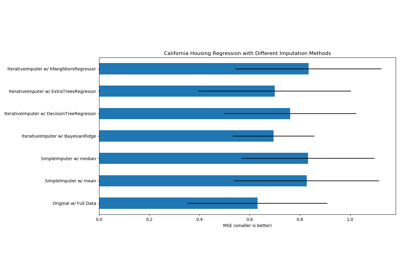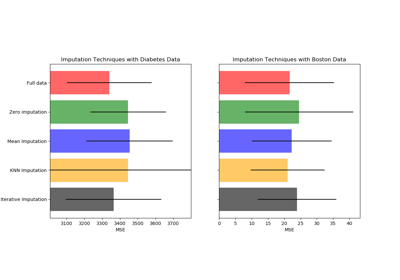sklearn.impute.SimpleImputer¶
-
class
sklearn.impute.SimpleImputer(missing_values=nan, strategy='mean', fill_value=None, verbose=0, copy=True, add_indicator=False)[source]¶ Imputation transformer for completing missing values.
Read more in the User Guide.
- Parameters
- missing_valuesnumber, string, np.nan (default) or None
The placeholder for the missing values. All occurrences of
missing_valueswill be imputed.- strategystring, default=’mean’
The imputation strategy.
If “mean”, then replace missing values using the mean along each column. Can only be used with numeric data.
If “median”, then replace missing values using the median along each column. Can only be used with numeric data.
If “most_frequent”, then replace missing using the most frequent value along each column. Can be used with strings or numeric data.
If “constant”, then replace missing values with fill_value. Can be used with strings or numeric data.
New in version 0.20: strategy=”constant” for fixed value imputation.
- fill_valuestring or numerical value, default=None
When strategy == “constant”, fill_value is used to replace all occurrences of missing_values. If left to the default, fill_value will be 0 when imputing numerical data and “missing_value” for strings or object data types.
- verboseinteger, default=0
Controls the verbosity of the imputer.
- copyboolean, default=True
If True, a copy of X will be created. If False, imputation will be done in-place whenever possible. Note that, in the following cases, a new copy will always be made, even if
copy=False:If X is not an array of floating values;
If X is encoded as a CSR matrix;
If add_indicator=True.
- add_indicatorboolean, default=False
If True, a
MissingIndicatortransform will stack onto output of the imputer’s transform. This allows a predictive estimator to account for missingness despite imputation. If a feature has no missing values at fit/train time, the feature won’t appear on the missing indicator even if there are missing values at transform/test time.
- Attributes
- statistics_array of shape (n_features,)
The imputation fill value for each feature. Computing statistics can result in
np.nanvalues. Duringtransform, features corresponding tonp.nanstatistics will be discarded.- indicator_
sklearn.impute.MissingIndicator Indicator used to add binary indicators for missing values.
Noneif add_indicator is False.
See also
IterativeImputerMultivariate imputation of missing values.
Notes
Columns which only contained missing values at
fitare discarded upontransformif strategy is not “constant”.Examples
>>> import numpy as np >>> from sklearn.impute import SimpleImputer >>> imp_mean = SimpleImputer(missing_values=np.nan, strategy='mean') >>> imp_mean.fit([[7, 2, 3], [4, np.nan, 6], [10, 5, 9]]) SimpleImputer() >>> X = [[np.nan, 2, 3], [4, np.nan, 6], [10, np.nan, 9]] >>> print(imp_mean.transform(X)) [[ 7. 2. 3. ] [ 4. 3.5 6. ] [10. 3.5 9. ]]
Methods
fit(self, X[, y])Fit the imputer on X.
fit_transform(self, X[, y])Fit to data, then transform it.
get_params(self[, deep])Get parameters for this estimator.
set_params(self, \*\*params)Set the parameters of this estimator.
transform(self, X)Impute all missing values in X.
-
__init__(self, missing_values=nan, strategy='mean', fill_value=None, verbose=0, copy=True, add_indicator=False)[source]¶ Initialize self. See help(type(self)) for accurate signature.
-
fit(self, X, y=None)[source]¶ Fit the imputer on X.
- Parameters
- X{array-like, sparse matrix}, shape (n_samples, n_features)
Input data, where
n_samplesis the number of samples andn_featuresis the number of features.
- Returns
- selfSimpleImputer
-
fit_transform(self, X, y=None, **fit_params)[source]¶ Fit to data, then transform it.
Fits transformer to X and y with optional parameters fit_params and returns a transformed version of X.
- Parameters
- Xnumpy array of shape [n_samples, n_features]
Training set.
- ynumpy array of shape [n_samples]
Target values.
- **fit_paramsdict
Additional fit parameters.
- Returns
- X_newnumpy array of shape [n_samples, n_features_new]
Transformed array.
-
get_params(self, deep=True)[source]¶ Get parameters for this estimator.
- Parameters
- deepbool, default=True
If True, will return the parameters for this estimator and contained subobjects that are estimators.
- Returns
- paramsmapping of string to any
Parameter names mapped to their values.
-
set_params(self, **params)[source]¶ Set the parameters of this estimator.
The method works on simple estimators as well as on nested objects (such as pipelines). The latter have parameters of the form
<component>__<parameter>so that it’s possible to update each component of a nested object.- Parameters
- **paramsdict
Estimator parameters.
- Returns
- selfobject
Estimator instance.




